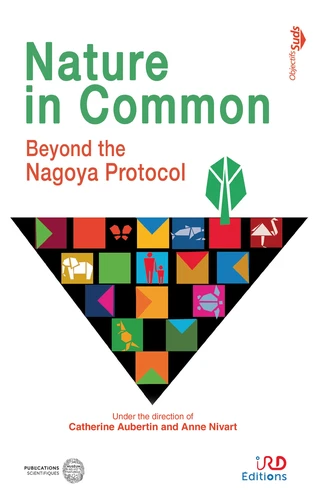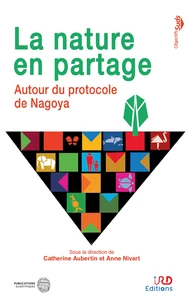- Accueil /
- Catherine Aubertin
Catherine Aubertin

Dernière sortie
Nature in Common. Beyond the Nagoya Protocol.
A landmark text in global biodiversity governance, the Nagoya Protocol was intended to put an end to the uncompensated exploitation of natural resources and knowledge originating in the Global South. Its stated objectives were to establish greater justice and equity between providers and users of genetic resources, to foreground the contributions and knowledge of indigenous peoples and local communities, and to decolonise research, all while promoting the conservation of biodiversity.
Thirty years on from the Convention on Biological Diversity from which it originated, the authors examine the legal and practical outcomes of this virtuous framework, which came into force in 2014. Although it has certainly fostered greater recognition of the plurality of knowledge and advanced the traceability of resources, the Protocol has also helped to impose a narrowly market-oriented understanding of nature and knowledge, exacerbating demands for recognition and ownership in the Global South, and effectively restricting access to biodiversity in an era of globalised research.
This book presents an interdisciplinary dialogue informed by the experiences of researchers and conservation stakeholders (local communities, managers of collections and natural parks). Looking beyond the Nagoya Protocol, it invites us to question the relationships between societies and nature in light of the ecological emergency. It is intended for anyone with an interest in the economics of biodiversity and environmental justice.
Thirty years on from the Convention on Biological Diversity from which it originated, the authors examine the legal and practical outcomes of this virtuous framework, which came into force in 2014. Although it has certainly fostered greater recognition of the plurality of knowledge and advanced the traceability of resources, the Protocol has also helped to impose a narrowly market-oriented understanding of nature and knowledge, exacerbating demands for recognition and ownership in the Global South, and effectively restricting access to biodiversity in an era of globalised research.
This book presents an interdisciplinary dialogue informed by the experiences of researchers and conservation stakeholders (local communities, managers of collections and natural parks). Looking beyond the Nagoya Protocol, it invites us to question the relationships between societies and nature in light of the ecological emergency. It is intended for anyone with an interest in the economics of biodiversity and environmental justice.
A landmark text in global biodiversity governance, the Nagoya Protocol was intended to put an end to the uncompensated exploitation of natural resources and knowledge originating in the Global South. Its stated objectives were to establish greater justice and equity between providers and users of genetic resources, to foreground the contributions and knowledge of indigenous peoples and local communities, and to decolonise research, all while promoting the conservation of biodiversity.
Thirty years on from the Convention on Biological Diversity from which it originated, the authors examine the legal and practical outcomes of this virtuous framework, which came into force in 2014. Although it has certainly fostered greater recognition of the plurality of knowledge and advanced the traceability of resources, the Protocol has also helped to impose a narrowly market-oriented understanding of nature and knowledge, exacerbating demands for recognition and ownership in the Global South, and effectively restricting access to biodiversity in an era of globalised research.
This book presents an interdisciplinary dialogue informed by the experiences of researchers and conservation stakeholders (local communities, managers of collections and natural parks). Looking beyond the Nagoya Protocol, it invites us to question the relationships between societies and nature in light of the ecological emergency. It is intended for anyone with an interest in the economics of biodiversity and environmental justice.
Thirty years on from the Convention on Biological Diversity from which it originated, the authors examine the legal and practical outcomes of this virtuous framework, which came into force in 2014. Although it has certainly fostered greater recognition of the plurality of knowledge and advanced the traceability of resources, the Protocol has also helped to impose a narrowly market-oriented understanding of nature and knowledge, exacerbating demands for recognition and ownership in the Global South, and effectively restricting access to biodiversity in an era of globalised research.
This book presents an interdisciplinary dialogue informed by the experiences of researchers and conservation stakeholders (local communities, managers of collections and natural parks). Looking beyond the Nagoya Protocol, it invites us to question the relationships between societies and nature in light of the ecological emergency. It is intended for anyone with an interest in the economics of biodiversity and environmental justice.
Les livres de Catherine Aubertin

2,99 €

2,99 €

Climate change. What challenges for the South?
Serge Janicot, Catherine Aubertin, Martial Bernoux, Edmond Dounias, Jean-François Guégan
E-book
2,99 €

2,99 €

2,99 €

2,99 €

35,00 €

Changement climatique. Quels défis pour le Sud ?
Catherine Aubertin, Edmond Dounias, Jean-François Guégan, Thierry Lebel
Grand Format
28,00 €

25,40 €

25,40 €

18,30 €


35,00 €

Cahiers Des Sciences Sociales Volume 30 N°1 - 2 1994 : Marche Et Developpement
Denis Cogneau, Collectif, Catherine Aubertin
25,92 €
